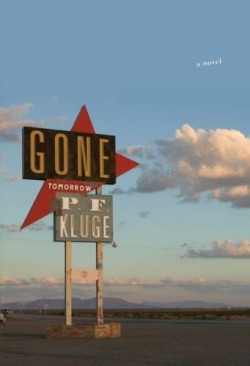Gone Tomorrow
Fear of failure wreaks havoc on writers in many ways, from writer’s block to completely abandoned manuscripts. Perhaps it is even powerful enough to cause a celebrated, talented novelist to perpetrate one of the biggest frauds in American literary history. When George Canaris is killed in a hit and run accident, decades of speculation are brought to a head as a young professor searches for the truth behind the promises of one last great work by the acclaimed novelist.
Kluge is a journalist, nonfiction author, writer-in-residence at Ohio’s Kenyon College, and the author of seven novels, includ-ing Eddie and the Cruisers. No doubt his experiences at Kenyon figure heavily into this newest novel, the story of a writer-turned-professor at a small college. Kluge’s writer, Canaris, leaves behind his life in Los Angeles for a job in rural Ohio, believing this move will allow him the time necessary to complete his promised next novel, labeled The Beast. Thirty-five years later, with no novel in sight, he is forced to resign to make way for a new superstar author. What follows is a year of reflection on his time at the col-lege and the controversial Beast.
Canaris’s account of this year is sandwiched between narration by Mark May, a fellow professor who finds himself literary executor of Canaris’s estate after an accident. This structure allows for subtle character building; Kluge deftly shows the differ-ence in writing style between the two men. Canaris’s section is smooth with fully drawn characters, settings, and descriptions, while May’s is not as polished—telling more than showing—reflecting a younger, less experienced, and less talented writer. It is a credit to Kluge’s skill as an author that he resists exaggerating these differences and keeps them subtle enough to avoid pulling the reader out of the story.
Kluge’s novel is more suspense than traditional mystery, filled with behind-the-scenes college politics, the emotional strug-gles of a writer facing his greatest work, and vignettes covering influential moments in Canaris’ life, from his childhood in old Hol-lywood to a return to his birthplace in communist Czechoslovakia. These many facets create a novel that will appeal to a wide range of readers, and the underlying question of whether or not The Beast actually exists will pull the reader eagerly through to the end.
Reviewed by
Christine Canfield
Disclosure: This article is not an endorsement, but a review. The publisher of this book provided free copies of the book to have their book reviewed by a professional reviewer. No fee was paid by the publisher for this review. Foreword Reviews only recommends books that we love. Foreword Magazine, Inc. is disclosing this in accordance with the Federal Trade Commission’s 16 CFR, Part 255.

